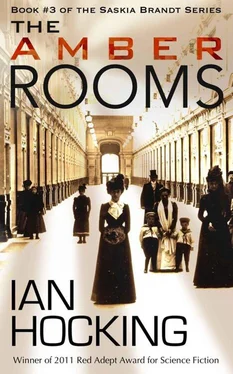The wind came from the true north. Flakes of snow were falling. They settled on her cheap boots. St Petersburg’s green winter was turning white and Saskia might have cried but for the blood in her tears. It would not do to be memorable.
She turned towards the unseen Tsar’s Village. The Amber Room was there. If she had decoded the vibrations of her time band correctly, it was a portal to the future. Her mind stopped once more on the greater question: Who was making the band vibrate? But the countdown had reached zero during the day. The doors of the Amber Room had closed. She did not know when they would open again.
Sleep-sleep-sleep, she thought.
Switzerland: Spring, 1908
The time traveller had spent winter in a district of Zurich called Aussersihl. Her modest garret was crammed with books, newspapers, unwashed dishes, and a gramophone. Two books were open on music stands: a French volume on methods of cheating at blackjack, and a Russian one on the Great Summer Palace of the Tsars. A chin-up bar had been hammered into the door frame of the bedroom.
The routine of these last weeks had not varied. Saskia would rise around ten or eleven and make coffee, with sugar if she had any. Then she would leave the garret and find her friends, and they would eat lunch. She would return to the garret, read, and meet other friends in the evening. She did not use the name Saskia. She was Godrun Müller, student of agronomy, runaway Bohemian princess to those who cared to ask.
One such was Yusha, a young man with red hair. He was the son of a rich Muscovite and had stopped in Zurich the previous summer on a Grand Tour. After this, he was due to assume the management of his father’s jewellery business, which was second only to Fabergé. Saskia thought him beautiful. In short, there was something of Robespierre about him. She had seen him almost killed in a pointless remonstration with two soldiers. Two of her friends had carried his unconscious body to her garret and laid him out on the bed. Saskia and Yusha had not made love that night, or any night. She had long decided that no man would have this body unless the mind perceiving those heights of sensation was that of Ute.
‘You,’ he had said, when he came around. ‘The woman from the café.’
That was a week ago. This morning, he was still sleeping.
Saskia lifted his arm from her chest and slowly rolled from the bed. Yusha smacked his lips and put his face into the pillow. She smiled at this, then checked his fob watch, which hung on the back of the chair nearest the bed. It was almost seven o’clock. The elderly apothecary downstairs, Herr Trachsel, would be making his coffee by now. The shutters were cut with daylight.
She used the toilet in her bathroom, rubbed water into her eyes, found the toothbrush, pressed this into some tooth powder, and, as she scraped it around her mouth, thought about going home.
Everything depended on her first contact in Zurich, the Count Nakhimov. His villa in Volketswil, not far from her garret, had become a second home for Saskia over the winter. She only visited during darkness and her existence was known only to one servant, Mr Jenner, whom she had never met. Count Nakhimov was a double agent playing with both the Tsarist and revolutionary elements. Saskia did not trust him. But he was straightforward, well connected, and one of the few people in Zurich who could give her background information about the Amber Room in the Great Summer Palace of the Tsars. Besides, he had been recommended.
Saskia returned to the bed and lifted away the blanket. Yusha was not disturbed by the removal. They both slept naked by habit, as the rising heat from the apothecary’s stoves made the garret comfortably warm. Yusha still snored into the pillow. His legs and arms were wide. He looked like a cross-country skier mid-stride.
With a little pressure on his hip, she rolled him onto his back. Still he did not stir. He stopped snoring, took a huge breath, and began to snore again.
Saskia smiled. Carefully, she took his penis in her hand. There was a thought that always occurred to her when she wanted to satisfy Yusha; the thought wounded her because she knew that, if revealed, she would be diminished in his eyes. On the night when Yusha was pushed down steps by the soldiers for chastising their rude treatment of a waitress, one of them had called him a ‘Kleine Hebe’. Little Jew. The term was not muttered. It was as clear as the lusty shout given at the sight of quarry. Many of the other customers had laughed. An otherwise unremarkable husband had turned to his wife and said, ‘Let’s see him buy his way out of this one.’ Saskia had straightened her back and favoured the onlookers with a reptilian stare. Within minutes, she had engineered Yusha’s escape.
She put her lips to his penis and woke him with, ‘ Shhhhh. ’
‘Morning,’ he whispered, stretching his arms.
‘Morning. Let’s not disturb Herr Trachsel.’
Yusha put his hands behind his head. His fingers messed with his beautiful curls. Saskia remembered the newsreel footage yet to come of bodies being driven into pits by the sweeping white blades of the bulldozers. She tried to suppress this thought by concentrating on Yusha. It almost worked.
~
Two embarrassing encounters with passers-by had been enough to convince Saskia that her habit of running for the sake of it should be indulged in isolation. Only the English gentlemen of the cafés considered it an appropriate form of exercise for a lady, and only then if the lady was a certified eccentric. The other nationalities thought it unhealthy and self-punitive. Here on the mountain, above the snow line, she felt far indeed from punishment. There was an atmospheric emptiness that seemed to draw the sweat off her scalp. Saskia wore her usual outfit of a woollen liberty corset and bloomers. She had tried plimsolls once, but they were too restrictive. Canvas slippers chaffed. Lately, she ran in leather Brogues with soles scored in a cross-hatch for grip.
She leaned into her sprint and placed the ball of each foot in the snow. The crust broke in wet squeaks. She imagined her chest empty on exhalation and full on inhalation. She took these breaths in ratio to her strides and assaulted the slope in fifty-metre pieces. Her route was steep and dangerous. She ran every Monday, Wednesday and Friday.
When the wind blew, the trees shuddered and leaned. Birds made black fireworks as she passed.
By late afternoon, she had passed through the deciduous trees to reach the conifers. Her last sprint took her to a high western meadow. The snow was deeper here. It scintillated. Two weaving animal tracks—probably hares—cut across its centre. Saskia put her hands on her hips and looked at Lake Lucerne. The air was clear enough for its ducks to be visible.
She brushed some snow from a flat rock and placed her rucksack on top of it. Then she undressed and bathed in the snow. She towelled herself and considered the altitude while eating a paste of powdered beef jerky and fat from an old tobacco tin. It would take another four hours to reach her bicycle, which she had left in a shed near Unterägeri.
She changed into her everyday clothes: an ankle-length skirt, boots, a white blouse, and a fur cap given to her by Yusha.
She heard cowbells. Following them down using a frozen stream whose heart had thawed to a vein-blue line, she found a cowherd not more than fifteen years old. He could not speak without shrugging and wobbling his hands in a seesawing motion. He charmed her. Saskia bought some cheese, which she ate while he spoke about a new rifle that his father had given him for Christmas. Ultimately, his voice trailed off. She looked at him, saw the direction of his gaze, and moved her skirt so that it covered her bare calf. The moment reminded her that this period of recuperation was coming to an end. She needed to return to Russia. She needed to go home. She needed to help a friend.
Читать дальше












